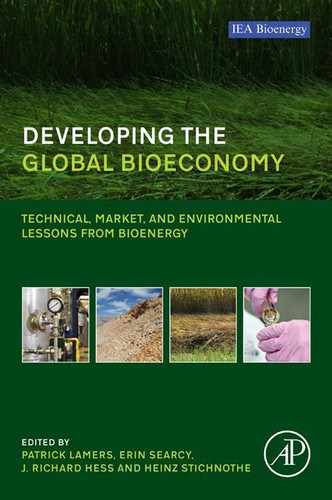Preface
IEA Bioenergy
IEA Bioenergy is an organization set up in 1978 by the International Energy Agency (IEA) with the aim of improving cooperation and information exchange between countries that have national programs in bioenergy research, development and deployment. As an international collaboration in bioenergy, IEA Bioenergy’s vision is to achieve a substantial bioenergy contribution to future global energy demands by accelerating the production and use of environmentally sound, socially accepted, and cost-competitive bioenergy on a sustainable basis, thus providing increased security of supply whilst reducing greenhouse gas emissions from energy use. The work of IEA Bioenergy is structured in a number of Tasks, which have well defined objectives, budgets, and time frames. More information on IEA Bioenergy is available at: http://www.ieabioenergy.com/.
Task 34
This task focuses on facilitating commercialization of biomass pyrolysis, and particularly fast pyrolysis to maximize liquid product yield and production of renewable fuel oil and transportation fuels by contributing to the resolution of critical technical areas and disseminating relevant information particularly to industry and policymakers. The task contributes to bio-oil standardization activities and reviews bio-oil production techniques and bio-oil application. The task cooperates with application developers and equipment manufacturers to help them understand more about bio-oil and its properties and requirements. This close cooperation is considered the most effective way of identifying and promoting opportunities for bio-oil to make a significant contribution to renewable energy supplies. More information on Task 34 is available at: http://www.pyne.co.uk/.
Task 40
The core objective of this task is to support the development of sustainable, international markets and international trade of biomass, recognizing the diversity in biomass resources and applications for bioenergy and biomaterials in the bioeconomy. Developing the sustainable and stable, international biomass market for energy and materials is a long-term process. It is particularly important to develop both supply and demand for biomass and energy carriers derived from biomass in a balanced way and avoid distortions and instability that can threaten investments in biomass production, infrastructure and conversion capacity. The task aims to provide a vital contribution to such (policy) decisions for market players, policymakers, and international bodies, as well as nongovernmental organizations. It aims to do so by providing high-quality information and analyses, such as this book. The focus on international biomass trade is a priority, although biomass will be increasingly utilized in the bioeconomy for new material purposes (eg, bioplastics) and thus find alternative uses before or in conjunction with the use for energy. More information on Task 40 is available at: http://www.bioenergytrade.org/.
Task 42
This task aims at contributing to the development and implementation of sustainable biorefineries—as part of highly efficient and zero waste value chains—synergistically producing food and feed ingredients, biobased chemicals and materials and bioenergy (fuels, power/heat) as a base for a global bioeconomy. The mission of Task 42 is to facilitate the commercialization and market deployment of environmentally sound, socially acceptable and cost-competitive biorefineries, and to advise policymakers and industrial decision-makers accordingly. Its strategy is to provide a platform for international collaboration and information exchange concerning biorefinery research, development, demonstration, and policies. More information on Task 42 is available at: http://www.iea-bioenergy.task42-biorefineries.com/en/ieabiorefinery.htm/.
